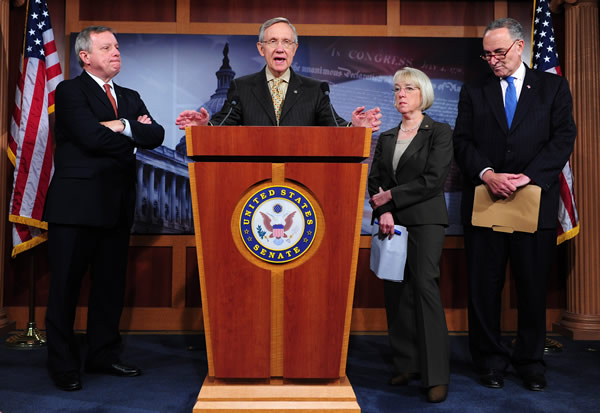Washington in a Flash: Shutdown Showdown
Lachlan Markay /
Driving the conversation: The Senate will vote today on a continuing resolution that would fund the federal government through Nov. 18 and provide $3.65 billion in disaster aid funding for the Federal Emergency Management Agency. If Congress does not act, the government will partially shut down at the end of the week, and FEMA’s disaster aid coffers will dry up by Wednesday.
Last week, the Senate rejected a House-passed CR due to budget offsets for the increase in disaster aid in the form of cuts to Energy Department loan programs. Republicans are hitting Harry Reid for threatening to “shut down the government rather than share [DoE loan program] funds with people in desperate need.” The battle over the CR mimics the debt ceiling debate, in which Republican House proposals were tabled in the Senate, while Senate Democrats tried to paint the GOP has “hostage-takers.”
An interesting Solyndra development: The Washington Times reports that the Democratic Party of California is listed as a creditor for defunct solar company – and perennial thorn in the Obama administration’s side – Solyndra.
Why California Democrats would be creditor to a company that received more than a half-billion dollars in federal loans to build a solar-panel plant isn’t clear. Even party officials say they’re not sure.
The California Democratic Party’s communications director, Tenoch Flores, said the organization was not owed “any funds in any form” by the California-based company. He said he was unclear why the party would be listed as a creditor in Solyndra’s bankruptcy filing.
According to campaign-finance records, Solyndra donated $7,500 to the California Democratic Party in October 2010. It’s legal in California for corporations to make donations. But that doesn’t explain why the company would identify the Democratic Party as a creditor in its bankruptcy filing a year later.
House Republicans are looking to keep Solyndra front-and-center throughout the August congressional recess. With developments like this, their task may not be too difficult.
The case for limited government: Why would the American people vote to give more power to an institution of which they disapprove by a greater than 4-to-1 margin? Gallup reports that Americans’ opinions of the federal government are at historic lows: 81 percent say they are dissatisfied with it, while only 19 percent say they are satisfied.
The challenge for conservatives is to show the direct correlation between the size of government and its ineffectiveness. As the size and scope of the federal bureaucracy grows, so too do its inefficiencies. The ever-expanding state also sparks unprecedented ideological conflict by forcing the issue of the philosophical path down which the country’s political system will venture. These factors make a smooth, friction-less legislative process more difficult, and hence erode Americans’ confidence in government’s ability to get things done.
Big government is ineffective government. It is no coincidence that the size of the federal leviathan and confidence in government are both at all-time highs. Conservatives who wish to reverse course should note that fact often.
Freedom of speech for me, and for thee: The AFL-CIO, which campaigned hard against the Supreme Court’s decision in Citizens United v. FEC, is finally discovering the merits of its liberating effect on political speech.
A welcome change, if it happens: Saudi Arabia announced over the weekend that for the first time in its history, women will be able to vote in the 2015 municipal elections.
Interesting, and timely: CBS News gets an exclusive look at New York City’s anti-terrorism efforts from NYPD commissioner Ray Kelly.
Infuriating: A violent Jihadist continues to roam the streets of London six years after he aided in devastating July 7, 2005 bombings in the city. Authorities have refused to deport the man, citing human rights concerns.

